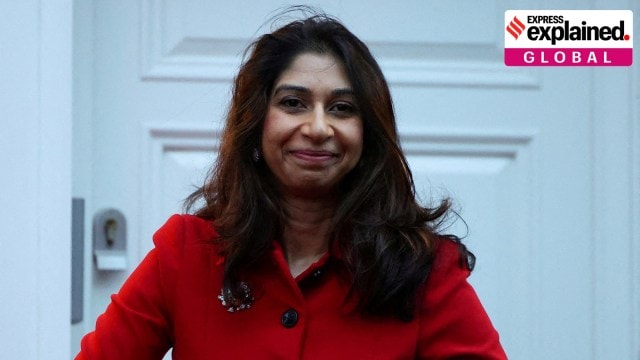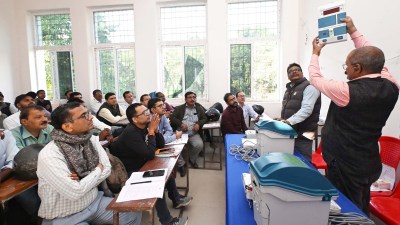Why has British PM Rishi Sunak sacked his most visible minister, Suella Braverman?
A hardline conservative leader, the Indian-origin cabinet member frequently grabbed headlines for her provocative comments on migrants, protesters, the police and the homeless.
 Britain's Home Secretary Suella Braverman walks outside her home, in London, Britain, November 13, 2023. REUTERS/Toby Melville
Britain's Home Secretary Suella Braverman walks outside her home, in London, Britain, November 13, 2023. REUTERS/Toby Melville British Prime Minister Rishi Sunak sacked his interior minister, Suella Braverman, on Monday (November 13), as part of a wider cabinet reshuffle just days after she criticised the police’s handling of pro-Palestinian marches in London.
Sunak was under growing pressure from opposition lawmakers and members of his own ruling Conservative Party to fire Braverman. A hardline conservative leader, the Indian-origin cabinet member frequently grabbed headlines for her provocative comments on migrants, protesters, the police and the homeless.
Speaking to the media, Braverman said, “It has been the greatest privilege of my life to serve as home secretary … I will have more to say in due course.”
What did Suella Braverman say?
A fresh controversy erupted after an article, ‘Police must be even-handed with protests’, written by Braverman and was published by The Times on November 8. In her piece, the minister accused the police of adopting “double standards” in its treatment of protests.
Criticising a pro-Palestinian demonstration, set to take place on November 11, Braverman wrote: “Right-wing and nationalist protesters who engage in aggression are rightly met with a stern response yet pro-Palestinian mobs displaying almost identical behaviour are largely ignored, even when clearly breaking the law? I have spoken to serving and former police officers who have noted this double standard.”
The minister also said the organisers of the protest “have links to terrorist groups, including Hamas” and called the demonstrators “hate marchers”.
On the day of the demonstration, skirmishes broke out between far-right counter-protesters and the police, who tried to keep them away from the 300,000 pro-Palestinian marchers. More than 140 people were arrested at the sport, according to Reuters.
The opposition Labour alleged that the clashes were sparked by Braverman’s comments. Members of the Conservative Party also criticised her and expressed despair at Sunak’s delay in sacking the minister.
One MP told The Guardian: “Every day she remains in office it further undermines the prime minister’s authority.”
Who is Suella Braverman?
Braverman is a Conservative leader and lawyer who was elected to the UK Parliament from Fairham in 2015 and served as attorney general for England and Wales from 2020 to 2022. She campaigned to leave the EU and served as a junior minister in the Brexit department under former PM Theresa May, but resigned in protest at her proposed Brexit deal, saying it did not go far enough in breaking ties with the bloc.
Braverman was among the leaders in the race to replace Boris Johnson as UK Prime Minister in 2022 but lost in the second round. She was then appointed interior minister under then PM Liz Truss but had to soon resign over a “technical” breach of government rules — Braverman sent an official document from her personal email account.
Braverman’s parents are of Indian origin and migrated to the UK in the 1960s. Her mother is from Mauritius and her father is from Kenya. While her mother is of Hindu Tamil descent, her father has Goan ancestry.
As a politician, Braverman has defended British colonialism and taken a hard line on immigrants, supporting their deportation to Rwanda. In her resignation letter, one of her criticisms of the Truss government was: “Not only have we broken key pledges that were promised to our voters, but I have had serious concerns about this government’s commitment to honouring manifesto commitments, such as reducing overall migration numbers and stopping illegal migration, particularly the dangerous small boats crossings.”



- 01
- 02
- 03
- 04
- 05


































